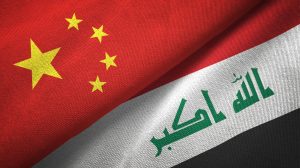China is the world’s largest crude oil importer, importing more than 11 million barrels daily. Almost half of this import need is supplied from Middle Eastern countries, although Russia is the single-largest supply of crude oil to China. Iraq is China’s third largest source of oil, after Russia and Saudi Arabia. As a result, the trade volume between the two countries has reached $50 billion, and according to Iraqi Ambassador to Beijing Shoresh Khalid, this volume is expected to exceed $55 billion by the end of this year. Iraq has, therefore, become a highly strategic country in the Middle East, where China seeks to maximize mutual economic interests.
Instead of establishing a military presence in the Middle East, China is pursuing a policy of expanding diplomatic contacts and increasing its influence, primarily through investments in the Belt and Road Initiative. In the words of the Chinese foreign minister, the aim is to preserve mutual interests without interfering in the internal affairs of countries. In relations with Iraq, efforts are being made to ensure that regional conflicts and crises do not affect shared economic interests, which are largely centered around oil.
Iraq needs to preserve its oil trade, especially with China. Currently, 35 percent of Iraqi oil is imported by China, which imports about 1.2 million barrels of crude oil from Iraq daily.
The fact that Chinese companies have won most of the contracts in recent awards of oil and gas exploration licenses in Iraq takes China-Iraq relations beyond the mere buying and selling of oil. China, which was already one of the leading operators of oil and gas fields in Iraq, has won the rights to exploit 10 more oil and gas fields in the recent licensing tenders. Iraqi Oil Minister Hayan Abdulghani emphasized that the agreements will increase Iraq’s proven oil reserves to 160 billion barrels. Apart from these new awards, China Petroleum and Chemical Corp (Sinopec for short), is the leading operator of four other major oil fields in Iraq.
China’s dominance in Iraq’s energy sector creates political interdependence between the two countries. The fact that Chinese companies are the leading operators of most of the fields in Iraq significantly impacts the amount of Iraq’s oil production and thus the oil revenues that constitute more than 90 percent of its economy.
More than 20 companies, including European, Arab, and Iraqi groups, pre-qualified for the licensing tender. However, it was China that emerged as the largest single foreign licensee, winning the tender for 10 oil and gas fields. The fact that European companies remained in the background and the United States did not participate in the tender at all is a clear indication of the shifting dynamics in global energy. For instance, Exxon Mobil withdrew from the West Qurna oil field project in Iraq in February this year and transferred its operational activities to PetroChina, further highlighting this shift.
Iraq, the country with the fourth largest oil reserves in OPEC, burns the associated gas extracted along with the oil from the oil fields. Iraq is unable to use the gas due to the destruction of infrastructure and inadequate pipelines as a result of wars and terrorist attacks. For this reason, Iraq imports a significant amount of natural gas from Iran for use in power plants near Baghdad.
The United States was expected to participate in this round of tenders to prevent Iraq’s dependency on Iranian gas. It was even reported that this issue was discussed during Iraqi Prime Minister Mohammed Sudani’s recent visit to the United States. In previous meetings with the U.S. side, Sudani had also tried to encourage U.S. companies to invest in Iraq’s oil and gas fields.
In recent years, the U.S. has tried to find a solution to Iraq’s wasted gas problem not through its own companies but by putting forward companies belonging to the Gulf countries. In this context, countries such as Saudi Arabia and the UAE have accelerated their contacts with the Iraqi side, and these contacts have been concretized with some agreements. Therefore, what is surprising is that Arab countries have lagged behind China in these license tenders.
The fact that Chinese companies have shown precise determination in front of the Gulf capital and obtained the licenses of these oil and gas fields is critical in showing China’s importance to the oil policy in Iraq. Today, China is the buyer of nearly half of Iraq’s oil and the leading operator of the oil fields that are being operated so that Iraq can produce more and more oil efficiently. The Chinese authorities want to turn the energy issue into an indispensable cornerstone of China-Iraq interdependence.

































